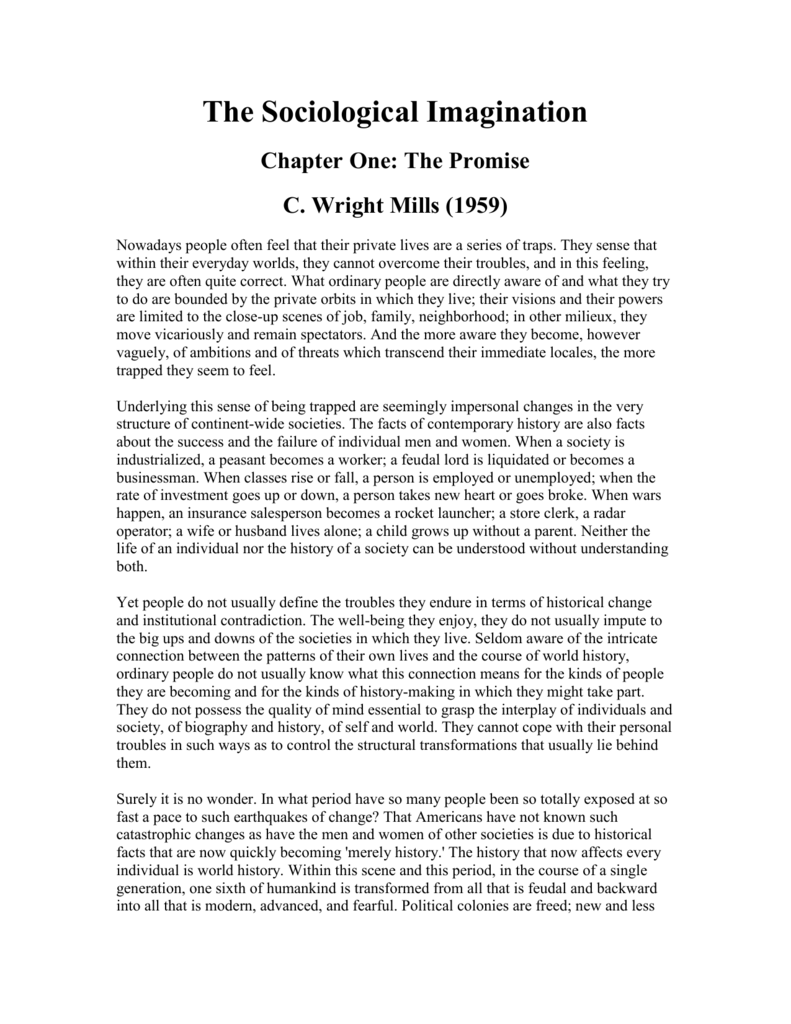Have you ever stopped to wonder why people behave the way they do, or why certain social trends become so prominent? Perhaps you’ve questioned the seemingly natural order of society, pondering its origins and potential for change. These are the seeds of sociological imagination, a mental framework that allows us to see beyond individual experiences and connect personal issues to broader societal patterns.
:max_bytes(150000):strip_icc()/sociological-imagination-3026756-FINAL-f28c1158b957481d9db68a1c0363e112.png)
Image: ar.inspiredpencil.com
Understanding sociological imagination is crucial for navigating a complex and ever-evolving world. It helps us deconstruct the “taken-for-granted” aspects of our lives, revealing hidden structures and power dynamics that influence our choices and shape our realities. This article delves into the concept of sociological imagination through everyday examples, providing a toolkit for understanding our world and empowering us to actively participate in shaping it.
Defining Sociological Imagination
Sociological imagination, coined by the pioneering sociologist C. Wright Mills, is the ability to connect personal experiences to broader societal forces. It’s about understanding that our lives are not isolated events but are shaped by the social, economic, political, and cultural structures within which we exist.
Instead of attributing our successes and failures to individual qualities alone, sociological imagination encourages us to consider the environment and circumstances that influence our choices and outcomes. It’s about seeing the individual within the context of the social fabric, recognizing that our experiences are shaped by historical trends, social norms, and power structures.
Everyday Examples of Sociological Imagination
1. The “Unemployment Problem” vs. Personal Struggles
Imagine a person struggling to find employment. Without sociological imagination, one might attribute this to individual failings like lack of skills or motivation. However, applying sociological imagination reveals that the “unemployment problem” is not solely a personal one.
- Economic Recession: A major economic downturn can significantly impact job availability, creating an environment where many individuals struggle regardless of their qualifications.
- Automation: Technological advancements and automation are replacing certain jobs, leading to structural unemployment and a mismatch between skills and available positions.
- Discrimination: Systemic biases and discrimination based on race, gender, or other factors can limit access to employment opportunities, regardless of individual merit.
By understanding the broader context, we can see that individual struggles with unemployment are often intertwined with larger societal trends. This perspective allows for more nuanced and effective solutions, shifting from individual blame to systemic interventions.

Image: webapi.bu.edu
2. The “Choice” of College
Consider a student who feels pressured to attend a prestigious university. From a purely individual perspective, this may seem like a personal decision based on ambition and desire for success. However, sociological imagination prompts us to explore the underlying social factors influencing this choice.
- Social Class: Access to higher education is often influenced by socioeconomic background. Students from privileged backgrounds may have greater access to resources, networks, and guidance, making certain choices more attainable.
- Cultural Capital: The values, knowledge, and social skills acquired through upbringing can also shape educational aspirations. Certain social groups may place a higher emphasis on academic achievement, influencing individuals to prioritize specific educational paths.
- Economic Incentives: A degree from a prestigious university can translate to higher earning potential and social status, making it a desirable choice even under financial constraints.
“Choosing” a certain university is often a reflection of social and economic realities rather than purely personal desires. This understanding challenges the notion of individual agency and highlights how societal pressures and inequalities shape individual choices.
3. The “Love Story” vs. Societal Norms
Think about your own romantic relationships. Is your choice of partner purely a matter of personal preference? Sociological imagination invites us to consider external factors shaping our romantic choices.
- Cultural Scripts: Our societies prescribe certain “acceptable” qualities and expectations for romantic partners. These scripts, rooted in gender roles, racial biases, and societal ideals, influence whom we find attractive and whom we feel comfortable pursuing.
- Social Networks: Our social circles often act as filters, dictating whom we encounter and limiting our exposure to individuals from diverse backgrounds. Proximity, shared interests, and social connections play a significant role in shaping our romantic possibilities.
- Economic Factors: Financial stability, class, and employment status can influence romantic choices, shaping perceptions of compatibility and suitability.
Understanding these social influences helps us move beyond simplistic notions of “falling in love” and recognize that romantic relationships are shaped by complex societal factors. This perspective allows us to question and challenge traditional norms, opening doors for more diverse and inclusive forms of love.
The Power of Sociological Imagination
Sociological imagination empowers us to see beyond individual experiences and connect them to larger social patterns. It enables us to identify problems, question assumptions, and propose solutions that address systemic issues rather than solely focusing on individual behaviors.
This powerful tool allows us to be more critical thinkers, more informed citizens, and more effective agents of change. By understanding how societal forces shape our lives, we can:
- Challenge the Status Quo: Question existing social structures and norms, fostering critical dialogue and driving social change.
- Advocate for Equality: Identify and address systemic inequalities that disadvantage certain groups, contributing to a more just and equitable society.
- Make Informed Decisions: Recognize the broader context within which we make choices, promoting more conscious and informed actions.
- Empathize with Others: See beyond individual differences and appreciate the shared experiences and challenges that unite us as members of a society.
Example Of Sociological Imagination
Conclusion
Sociological imagination is not just an academic concept; it’s a vital tool for understanding and navigating our complex world. By recognizing the intricate interplay of individual experiences and societal structures, we can move beyond personal perspectives to adopt a broader, more informed lens. This framework equips us to identify problems, challenge assumptions, and contribute meaningfully to creating a more just, equitable, and sustainable future. Explore resources and engage in critical discussions to cultivate your own sociological imagination, and empower yourself to become an active agent of social change.






